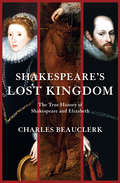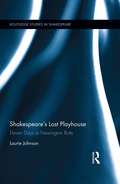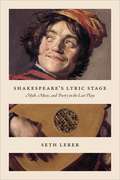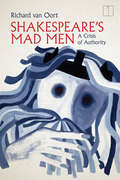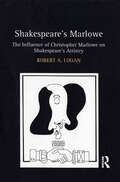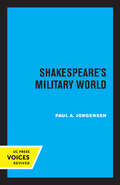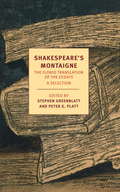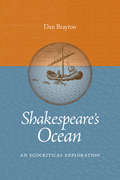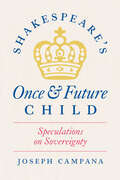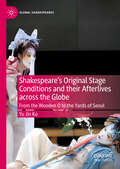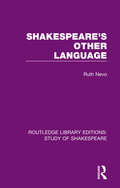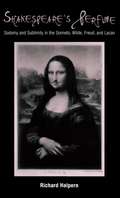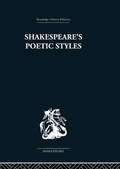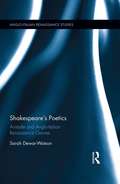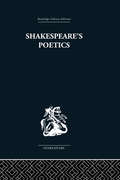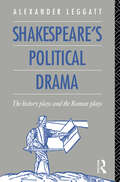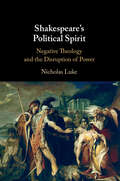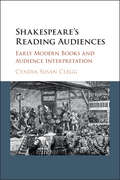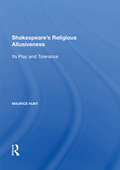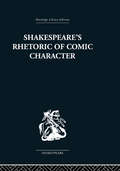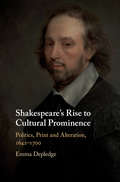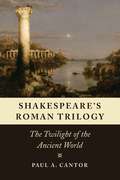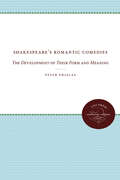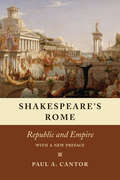- Table View
- List View
Shakespeare's Lost Kingdom: The True History of Shakespeare and Elizabeth
by Charles Beauclerk“A book for anyone who loves Shakespeare . . . One of the most scandalous and potentially revolutionary theories about the authorship of these immortal works” (Mark Rylance, First Artistic Director of Shakespeare’s Globe Theatre). It is perhaps the greatest story never told: the truth behind the most enduring works of literature in the English language, perhaps in any language. Who was William Shakespeare? Critically acclaimed historian Charles Beauclerk has spent more than two decades researching the authorship question, and if the plays were discovered today, he argues, we would see them for what they are—shocking political works written by a court insider, someone with the monarch’s indulgence, shielded from repression in an unstable time of armada and reformation. But the author’s identity was quickly swept under the rug after his death. The official history—of an uneducated merchant writing in near obscurity, and of a virginal queen married to her country—dominated for centuries. Shakespeare’s Lost Kingdom delves deep into the conflicts and personalities of Elizabethan England, as well as the plays themselves, to tell the true story of the “Soul of the Age.” “Beauclerk’s learned, deep scholarship, compelling research, engaging style and convincing interpretation won me completely. He has made me view the whole Elizabethan world afresh. The plays glow with new life, exciting and real, infused with the soul of a man too long denied his inheritance.” —Sir Derek Jacobi
Shakespeare's Lost Playhouse: Eleven Days at Newington Butts (Routledge Studies in Shakespeare)
by Laurie JohnsonThe playhouse at Newington Butts has long remained on the fringes of histories of Shakespeare’s career and of the golden age of the theatre with which his name is associated. A mile outside London, and relatively disused by the time Shakespeare began his career in the theatre, this playhouse has been easy to forget. Yet for eleven days in June, 1594, it was home to the two companies that would come to dominate the London theatres. Thanks to the ledgers of theatre entrepreneur, Philip Henslowe, we have a record of this short venture. Shakespeare's Lost Playhouse is an exploration of a brief moment in time when the focus of the theatrical world in England was on this small playhouse. To write this history, Laurie Johnson draws on archival studies, archaeology, environmental studies, geography, social, political, and cultural studies as well as methods developed within literary and theatre history to expand the scope of our understanding of the theatres, the rise of the playing business, and the formations of the playing companies.
Shakespeare's Lyric Stage: Myth, Music, and Poetry in the Last Plays
by Seth LererWhat does it mean to have an emotional response to poetry and music? And, just as important but considered less often, what does it mean not to have such a response? What happens when lyric utterances—which should invite consolation, revelation, and connection—somehow fall short of the listener’s expectations? As Seth Lerer shows in this pioneering book, Shakespeare’s late plays invite us to contemplate that very question, offering up lyric as a displaced and sometimes desperate antidote to situations of duress or powerlessness. Lerer argues that the theme of lyric misalignment running throughout The Tempest, The Winter’s Tale, Henry VIII, and Cymbeline serves a political purpose, a last-ditch effort at transformation for characters and audiences who had lived through witch-hunting, plague, regime change, political conspiracies, and public executions. A deep dive into the relationship between aesthetics and politics, this book also explores what Shakespearean lyric is able to recuperate for these “victims of history” by virtue of its disjointed utterances. To this end, Lerer establishes the concept of mythic lyricism: an estranging use of songs and poetry that functions to recreate the past as present, to empower the mythic dead, and to restore a bit of magic to the commonplaces and commodities of Jacobean England. Reading against the devotion to form and prosody common in Shakespeare scholarship, Lerer’s account of lyric utterance’s vexed role in his late works offers new ways to understand generational distance and cultural change throughout the playwright’s oeuvre.
Shakespeare's Mad Men: A Crisis of Authority (Square One: First-Order Questions in the Humanities)
by Richard van OortThis book is about a mad king and a mad duke. With original and iconoclastic readings, Richard van Oort pioneers the reading of Shakespeare as an ethical thinker of the "originary scene," the scene in which humans became conscious of themselves as symbol-using moral and narrative beings. Taking King Lear and Measure for Measure as case studies, van Oort shows how the minimal concept of an anthropological scene of origin—the "originary hypothesis"—provides the basis for a new understanding of every aspect of the plays, from the psychology of the characters to the ethical and dialogical conflicts upon which the drama is based. The result is a gripping commentary on the plays. Why does Lear abdicate and go mad? Why does Edgar torture his father with non-recognition? Why does Lucio accuse the Duke in Measure for Measure of madness and lechery, and why does Isabella remain silent at the end? In approaching these and other questions from the perspective of the originary hypothesis, van Oort helps us to see the ethical predicament of the plays, and, in the process, makes Shakespeare new again.
Shakespeare's Marlowe: The Influence of Christopher Marlowe on Shakespeare's Artistry
by Robert A. LoganMoving beyond traditional studies of sources and influence, Shakespeare's Marlowe analyzes the uncommonly powerful aesthetic bond between Christopher Marlowe and William Shakespeare. Not only does this study take into account recent ideas about intertextuality, but it also shows how the process of tracking Marlowe's influence itself prompts questions and reflections that illuminate the dramatists' connections. Further, after questioning the commonly held view of Marlowe and Shakespeare as rivals, the individual chapters suggest new possible interrelationships in the formation of Shakespeare's works. Such examination of Shakespeare's Marlovian inheritance enhances our understanding of the dramaturgical strategies of each writer and illuminates the importance of such strategies as shaping forces on their works. Robert Logan here makes plain how Shakespeare incorporated into his own work the dramaturgical and literary devices that resulted in Marlowe's artistic and commercial success. Logan shows how Shakespeare's examination of the mechanics of his fellow dramatist's artistry led him to absorb and develop three especially powerful influences: Marlowe's remarkable verbal dexterity, his imaginative flexibility in reconfiguring standard notions of dramatic genres, and his astute use of ambivalence and ambiguity. This study therefore argues that Marlowe and Shakespeare regarded one another not chiefly as writers with great themes, but as practicing dramatists and poets-which is where, Logan contends, the influence begins and ends.
Shakespeare's Military World
by Paul A. JorgensenThis title is part of UC Press's Voices Revived program, which commemorates University of California Press’s mission to seek out and cultivate the brightest minds and give them voice, reach, and impact. Drawing on a backlist dating to 1893, Voices Revived makes high-quality, peer-reviewed scholarship accessible once again using print-on-demand technology. This title was originally published in 1973.
Shakespeare's Montaigne
by Michel De Montaigne Stephen Greenblatt John Florio Peter G. PlattAn NYRB Classics OriginalShakespeare, Nietzsche wrote, was Montaigne's best reader--a typically brilliant Nietzschean insight, capturing the intimate relationship between Montaigne's ever-changing record of the self and Shakespeare's kaleidoscopic register of human character. And there is no doubt that Shakespeare read Montaigne--though how extensively remains a matter of debate--and that the translation he read him in was that of John Florio, a fascinating polymath, man-about-town, and dazzlingly inventive writer himself.Florio's Montaigne is in fact one of the masterpieces of English prose, with a stylistic range and felicity and passages of deep lingering music that make it comparable to Sir Robert Burton's Anatomy of Melancholy and the works of Sir Thomas Browne. This new edition of this seminal work, edited by Stephen Greenblatt and Peter G. Platt, features an adroitly modernized text, an essay in which Greenblatt discusses both the resemblances and real tensions between Montaigne's and Shakespeare's visions of the world, and Platt's introduction to the life and times of the extraordinary Florio. Altogether, this book provides a remarkable new experience of not just two but three great writers who ushered in the modern world.
Shakespeare's Ocean: An Ecocritical Exploration (Under the Sign of Nature: Explorations in Ecocriticism)
by Dan BraytonStudy of the sea--both in terms of human interaction with it and its literary representation--has been largely ignored by ecocritics. In Shakespeare's Ocean, Dan Brayton foregrounds the maritime dimension of a writer whose plays and poems have had an enormous impact on literary notions of nature and, in so doing, plots a new course for ecocritical scholarship.Shakespeare lived during a time of great expansion of geographical knowledge. The world in which he imagined his plays was newly understood to be a sphere covered with water. In vital readings of works ranging from The Comedy of Errors to the valedictory The Tempest, Brayton demonstrates Shakespeare's remarkable conceptual mastery of the early modern maritime world and reveals a powerful benthic imagination at work.
Shakespeare's Once and Future Child: Speculations on Sovereignty
by Joseph CampanaA study of Shakespeare’s child figures in relation to their own political moment, as well as our own. Politicians are fond of saying that “children are the future.” How did the child become a figure for our political hopes? Joseph Campana’s book locates the source of this idea in transformations of childhood and political sovereignty during the age of Shakespeare, changes spectacularly dramatized by the playwright himself. Shakespeare’s works feature far more child figures—and more politically entangled children—than other literary or theatrical works of the era. Campana delves into this rich corpus to show how children and childhood expose assumptions about the shape of an ideal polity, the nature of citizenship, the growing importance of population and demographics, and the question of what is or is not human. As our ability to imagine viable futures on our planet feels ever more limited, and as children take up legal proceedings to sue on behalf of the future, it behooves us to understand the way past child figures haunt our conversations about intergenerational justice. Shakespeare offers critical precedents for questions we still struggle to answer.
Shakespeare's Original Stage Conditions and their Afterlives across the Globe: From the Wooden O to the Yards of Seoul (Global Shakespeares)
by Yu Jin KoThis book brings together two separate fields by combining a study of Shakespeare's original stage conditions with an exploration of his plays in performance across the globe. The book contributes new insights into how early-modern stage conditions shaped the writing, production, and reception of Shakespeare's plays, but takes the further step of examining how original stage conditions re-emerge, not only in Globe replicas like the London Globe, but in unexpected and sometimes unconscious reconfigurations in adaptations and productions from around the world: film versions of Othello from Mexico to India that take dancing cues and anxieties about dance from the play and centralize dance; Korean adaptations for the madang (or yard) that reimagine Shakespeare's theatrical spaces and their relationships to audiences; Noh re-imaginings on film and onstage that foreground the theatrical; a teen film remake of Othello that raises questions about how blackness is figured today and on Shakespeare's stage, among others. By studying original stage conditions and their global afterlives, the book illuminates how global productions negotiate historical and cultural differences and thereby, paradoxically, engage with the cultural specificities of the present.
Shakespeare's Other Language (Routledge Library Editions: Study of Shakespeare)
by Ruth NevoShakespeare’s last plays, the tragicomic Romances, are notoriously strange plays, riddled with fabulous events and incredible coincidences, magic and dream. These features have sometimes been interpreted as the carelessness of an of an aging dramatist weary of his craft, or justified as folklore motifs, suitable to the romance tale. But neither view explains the fascination and power these plays still exert. Originally published in 1987, Ruth Nevo’s book offers a reading of the plays which invokes the findings and methods of post-psychoanalytic semiotics. Drawing on a Lacanian model of the "textual unconscious", she embarks on searching analyses of Pericles, Cymbeline, The Winter’s Tale, and The Tempest, brilliantly illuminating their apparent absurdities and anomalies, their bizarre or preposterous events and obscurely motivated actions, their often puzzling syntax. Her investigation of the plays’ informing fantasies produces unified and enriched readings which serve both to rehabilitate those plays which have been less than highly thought of, and to disclose new significance in the acknowledged masterpieces.
Shakespeare's Perfume: Sodomy and Sublimity in the Sonnets, Wilde, Freud, and Lacan
by Richard HalpernStarting with St. Paul's argument that the Greeks were afflicted with homosexuality to punish their excessive love of statues, Richard Halpern uncovers a tradition in which aesthetic experience gives birth to the sexual—and thus reverses the Freudian thesis that erotic desire is sublimated into art. Rather, Halpern argues, sodomy was implicated with aesthetic categories from the very start, as he traces a connection between sodomy and the unrepresentable that runs from Shakespeare's Sonnets to Oscar Wilde's novella The Portrait of Mr. W.H., Freud's famous essay on Leonardo da Vinci, and Jacques Lacan's seminar on the ethics of psychoanalysis. Drawing on theology, alchemy, psychoanalysis, philosophy, and literary criticism, Shakespeare's Perfume explores how the history of aesthetics and the history of sexuality are fundamentally connected.
Shakespeare's Poetic Styles: Verse into Drama
by John BaxterFirst published in 1980. At their most successful, Shakespeare's styles are strategies to make plain the limits of thought and feeling which define the significance of human actions. John Baxter analyses the way in which these limits are reached, and also provides a strong argument for the idea that the power of Shakespearean drama depends upon the co-operation of poetic style and dramatic form. Three plays are examined in detail in the text: The Tragedy of Mustapha by Fulke Greville and Richard II and Macbeth by Shakespeare.
Shakespeare's Poetics: Aristotle and Anglo-Italian Renaissance Genres (Anglo-Italian Renaissance Studies)
by Sarah Dewar-WatsonThe startling central idea behind this study is that the rediscovery of Aristotle's Poetics in the sixteenth century ultimately had a profound impact on almost every aspect of Shakespeare's late plays”their sources, subject matter and thematic concerns. Shakespeare's Poetics reveals the generic complexity of Shakespeare's late plays to be informed by contemporary debates about the tonal and structural composition of tragicomedy. Author Sarah Dewar-Watson re-examines such plays as The Winter's Tale, Pericles and The Tempest in light of the important work of reception which was undertaken in Italy by pioneering theorists such as Giambattista Giraldi Cinthio (1504-73) and Giambattista Guarini (1538-1612). The author demonstrates ways in which these theoretical developments filtered from their intellectual base in Italy to the playhouses of early modern England via the work of dramatists such as Jonson and Fletcher. Dewar-Watson argues that the effect of this widespread revaluation of genre not only extends as far as Shakespeare, but that he takes a leading role in developing its possibilities on the English stage. In the course of pursuing this topic, Dewar-Watson also engages with several areas of current scholarly debate: the nature of Shakespeare's authorship; recent interest in and work on Shakespeare's later plays; and new critical work on Italian language-learning in Renaissance England. Finally, Shakespeare's Poetics develops current critical thinking about the place of Greek literature in Renaissance England, particularly in relation to Shakespeare.
Shakespeare's Poetics: In relation to King Lear
by Russell A FraserFirst published in 1962. This volume gives as complete an account as possible of the Shakespearian experience, particularly in terms of one play, King Lear, but in general against the context of all of Shakespeare's work and that of the age in which it was created. Chapters cover: King Lear in the Renaissance; Providence; Kind; Fortune; Anarchy and Order; Reason and Will; Show and Substance; Redemption and Shakespeare's Poetics.
Shakespeare's Political Drama: The History Plays and the Roman Plays
by Alexander LeggattFirst published in 1989. Routledge is an imprint of Taylor & Francis, an informa company.
Shakespeare's Political Spirit: Negative Theology and the Disruption of Power
by Nicholas LukeThis exciting and challenging study reorients how we think about politics in Shakespeare and on the early modern stage. By reading Shakespeare's political drama as a negative mode of political experience and thought, Nicholas Luke allows us to appreciate the imaginative and disruptive elements of plays that might seem politically pessimistic. Drawing on a long religious and philosophical tradition of negativity and considering the writings of Hegel, Kierkegaard, Benjamin, Adorno, Derrida and Badiou, Luke pursues a phenomenology of political spirit that looks to the creative potential of experiences of failure, haunting, estrangement, impasse and dream. Through his notion of a negative political theology, he challenges traditional understandings of political theology and shows that Shakespeare's drama of negativity is more than a form of pessimistic critique, but rather a force of freedom and invention that animates the political imaginations of its audience.
Shakespeare's Possible Worlds
by Simon PalfreyNew methods are needed to do justice to Shakespeare. His work exceeds conventional models, past and present, for understanding playworlds. In this book, Simon Palfrey goes right to the heart of early modern popular drama, revealing both how it works and why it matters. Unlike his contemporaries, Shakespeare gives independent life to all his instruments, and to every fraction and fragment of the plays. Palfrey terms these particles 'formactions' - theatre-specific forms that move with their own action and passion. Palfrey's book is critically daring in both substance and format. Its unique mix of imaginative gusto, thought experiments, and virtuosic technique generates piercing close readings of the plays. There is far more to playlife than meets the eye. Influenced by Leibniz's visionary original model of possible worlds, Palfrey opens up the multiple worlds of Shakespeare's language, scenes, and characters as never before.
Shakespeare's Reading Audiences: Early Modern Books and Audience Interpretation
by Cyndia Susan CleggThis study grows out of the intersection of two realms of scholarly investigation - the emerging public sphere in early modern England and the history of the book. <P><P>Shakespeare's Reading Audiences examines the ways in which different communities - humanist, legal, religious and political - would have interpreted Shakespeare's plays and poems, whether printed or performed. <P>Cyndia Susan Clegg begins by analysing elite reading clusters associated with the Court, the universities, and the Inns of Court and how their interpretation of Shakespeare's Sonnets and Henry V arose from their reading of Italian humanists. <P><P>She concludes by examining how widely held public knowledge about English history both affected Richard II's reception and how such knowledge was appropriated by the State. <P>She also considers The Merry Wives of Windsor, Henry V, and Othello from the point of view of audience members conversant in popular English legal writing and Macbeth from the perspective of popular English Calvinism.
Shakespeare's Religious Allusiveness: Its Play and Tolerance (Shakespeare Studies)
by Maurice HuntShakespeare's Religious Allusiveness complicates debates about whether Shakespeare's plays are fundamentally Protestant or Catholic in sympathy, challenging analyses that either find Protestant elements consistently undercutting Catholic motifs or, less often, discover evidence of the playwright's endorsement of Catholic doctrine and customs. Rather, Maurice Hunt argues that Shakespeare's syncretistic method of incorporating both Protestant and Catholic elements into his plays was singular among early modern English playwrights at a time when governmental and social tolerance of Protestantism in the theatre was high and criticism of stereotyped Catholicism was correspondingly rampant in drama. In-depth discussions of The Two Gentlemen of Verona, the Second Henriad, All's Well That Ends Well, Twelfth Night, and Othello reveal how Shakespeare allusively integrates Reformation Protestant and Roman Catholic motifs and systems of thought. This book sheds new light on the playwright's knowledge of and interest in Elizabethan and Jacobean religious debates over the nature of spiritual reformation, the efficacy of merit for redemption, and the operation of Providence. It will appeal not only to Shakespeare scholars but to those interested in the cultural history of the Reformation.
Shakespeare's Rhetoric of Comic Character: Dramatic Convention In Classical And Renaissance Comedy
by Karen NewmanFirst published in 1985. In this revisionist history of comic characterization, Karen Newman argues that, contrary to received opinion, Shakespeare was not the first comic dramatist to create self-conscious characters who seem 'lifelike' or 'realistic'. His comic practice is firmly set within a comic tradition which stretches from Plautus and Menander to playwrights of the Italian Renaissance.
Shakespeare's Rise to Cultural Prominence: Politics, Print and Alteration, 1642–1700
by Emma DepledgeShakespeare's rise to prominence was by no means inevitable. While he was popular in his lifetime, the number of new editions and revivals of his plays declined over the following decades. Emma Depledge uses the methodologies of book and theatre history to provide a re-assessment of the reputation and dissemination of Shakespeare during the Interregnum and Restoration. She demonstrates the crucial role of the Exclusion Crisis (1678–1682), a political crisis over the royal succession, as a foundational moment in Shakespeare's canonisation. The period saw a sudden surge of theatrical alterations and a significantly increased rate of new editions and stage revivals. In the wake of the Exclusion Crisis, Shakespeare's plays were made available on a scale not witnessed since the early seventeenth century, thus reversing what might otherwise have been a permanent disappearance of his drama from canonical familiarity and firmly establishing Shakespeare's work in the national cultural imagination.
Shakespeare's Roman Trilogy: The Twilight of the Ancient World
by Paul A. CantorPaul A. Cantor first probed Shakespeare’s Roman plays—Coriolanus, Julius Caeser, and Antony and Cleopatra—in his landmark Shakespeare’s Rome (1976). With Shakespeare’s Roman Trilogy, he now argues that these plays form an integrated trilogy that portrays the tragedy not simply of their protagonists but of an entire political community. Cantor analyzes the way Shakespeare chronicles the rise and fall of the Roman Republic and the emergence of the Roman Empire. The transformation of the ancient city into a cosmopolitan empire marks the end of the era of civic virtue in antiquity, but it also opens up new spiritual possibilities that Shakespeare correlates with the rise of Christianity and thus the first stirrings of the medieval and the modern worlds. More broadly, Cantor places Shakespeare’s plays in a long tradition of philosophical speculation about Rome, with special emphasis on Machiavelli and Nietzsche, two thinkers who provide important clues on how to read Shakespeare’s works. In a pathbreaking chapter, he undertakes the first systematic comparison of Shakespeare and Nietzsche on Rome, exploring their central point of contention: Did Christianity corrupt the Roman Empire or was the corruption of the Empire the precondition of the rise of Christianity? Bringing Shakespeare into dialogue with other major thinkers about Rome, Shakespeare’s Roman Trilogy reveals the true profundity of the Roman Plays.
Shakespeare's Romantic Comedies: The Development of Their Form and Meaning
by Peter G. PhialasPhialas provides commentaries on Shakespeare's romantic comedies, treats in detail individual scenes and characters, and makes illuminating comparisons and contrasts of character with character. The chief concern of the book is with the action of each play, the nature and relationship of its parts, and the meaning that the action dramatizes.Originally published in 1966.A UNC Press Enduring Edition -- UNC Press Enduring Editions use the latest in digital technology to make available again books from our distinguished backlist that were previously out of print. These editions are published unaltered from the original, and are presented in affordable paperback formats, bringing readers both historical and cultural value.
Shakespeare's Rome: Republic and Empire
by Paul A. CantorFor more than forty years, Paul Cantor’s Shakespeare’s Rome has been a foundational work in the field of politics and literature. While many critics assumed that the Roman plays do not reflect any special knowledge of Rome, Cantor was one of the first to argue that they are grounded in a profound understanding of the Roman regime and its changes over time. Taking Shakespeare seriously as a political thinker, Cantor suggests that his Roman plays can be profitably studied in the context of the classical republican tradition in political philosophy. In Shakespeare’s Rome, Cantor examines the political settings of Shakespeare’s Roman plays, Coriolanus and Antony and Cleopatra, with references as well to Julius Caesar. Cantor shows that Shakespeare presents a convincing portrait of Rome in different eras of its history, contrasting the austere republic of Coriolanus, with its narrow horizons and martial virtues, and the cosmopolitan empire of Antony and Cleopatra, with its “immortal longings” and sophistication bordering on decadence.
